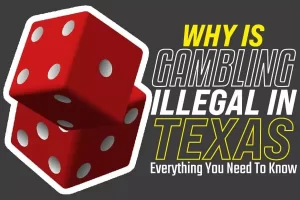Why Is Gambling Illegal In Texas: Everything You Need To Know
Share
Gambling, whether it’s done online or at a neighborhood casino, is illegal in Texas. The only form of gambling allowed by state law is charitable bingo.
However, that doesn’t mean that you can’t have fun betting on sports or playing video poker at one of the many casinos along the border with Mexico.
The state houses two tribal casinos near El Paso and Dallas, but gambling is still illegal outside of these areas.
This article will explain why gambling is illegal in Texas, how laws have been shaped throughout the years in the Lone Star State.
Why is Gambling Illegal in Texas?
Gambling is illegal because it may harm individuals who are susceptible to gambling harm by losing all their money and investments. Gambling could also give way to money laundering and transference of criminal proceedings, which is wrong.
While Texas prohibits many forms of gambling, there are several exceptions to the rule. These vary depending on the type of games being played and where they are being played.
A Brief History Of Gambling In Texas
Texas has a rich and sometimes sordid history of gambling. The Texas Legislature legalized casino gambling in 1991.
The first casino opened in 1992, and the state began to promote gambling to bring in much-needed revenue aggressively.
The problem is that the Texas Constitution prohibits any activity declared illegal by federal law, including gambling.
Native American casino owned by the Tigua tribe, established in 1996 to preserve tribal culture and traditions.
Texas had no legal gambling establishments until 1988, when Congress passed the Indian Gaming Regulatory Act.
In 1998, the U.S. Supreme Court ruled that the Federal Indian Gaming Act of 1988 was unconstitutional congressional power. States retain their authority to regulate or prohibit the operation of gaming activities in Indian territories.
This was a massive blow to the state’s plans for casinos and put a damper on its efforts to get revenues.
As with most laws designed to protect people from themselves, there is a little wiggle room in this law that allows some forms of gambling to occur, and some states and cities within Texas take full advantage.
In 2015, the National Indian Gaming Commission passed the opinion that the Alabama -Coushatta and the Tigua Tribe could conduct gaming activities legally.
What Forms Of Gambling Are Legal In Texas
Gambling in Texas is illegal in most cases. This includes not only gambling for money but also betting on pure games of chance.
By law, the only exception to this rule is lotteries that benefit the state of Texas or a political subdivision within the state.
In recent years, Texas has been a leader in gambling. The state is the greatest in terms of its overall revenue from gambling due to the number of legal forms of gambling.
There are three different types of legal gambling in Texas:
- Lottery
- Pari-mutuel wagering
- Charitable bingo and raffles
- Indian gaming
Lottery
The Texas Lottery Commission operates three lotteries: the multi-state Powerball and Mega Millions of games and several scratch ticket games.
It also offers instant tickets for sale at selected retailers, with odds of winning any prize ranging from one in 500 to one in 2000.
Unlike other states, Texas does not allow facilities to sell or lease video lottery terminals (VLTs) and only allows the state lottery to offer its games over the Internet.
Parimutuel Wagering
Pari-mutual wagering is when individuals can bet on horses or greyhounds at a track in a particular city in Texas. This type of gambling has been going on for decades.
The Texas legislature has authorized pari-mutuel wagering at racetracks and off-track betting sites. It was first legalized in 1933 during the Great Depression as a way of generating revenue.
In April 1994, Sam Houston Race Park was opened in Houston, while the Retama Park racetrack in Selma was in April 1995. The two facilities have a combined annual wagering capacity of approximately $1 billion.
The Texas Racing Commission (TRC) was established in 1987 by the Texas Legislature to regulate pari-mutuel wagering and ensure that horse racing continues as a viable economic enterprise.
The Commission comprises nine members, seven of whom are appointed by the Governor to staggered six-year terms.
The Commission regulates horse racing venues across Texas, including thoroughbred racetracks, quarter horse tracks, and harness tracks.
Charitable Gaming
Charitable gaming has been around since the Great Depression, but it was not until 2008 that it sprang on to the scene as the fastest growing sector in charitable giving. The fast-paced and fun new way for charitable organizations to raise money.
Texas alone has over 300,000 individual players who donate an average of $22 per game. There are currently hundreds of thousands of active players in the United States.
The organization regulates charitable gaming to ensure that proceeds from such events are used for charitable purposes and do not include any form of gambling.
The Gaming Authority of Texas oversees all aspects of charitable gaming in the state. It regulates and licenses organizations wishing to host charity events, trains gaming administrators, and provides funding for approved charities wishing to host gaming events.
The organization also handles all funds generated from such events and ensures that they benefit the community.
Bingo
In Texas, Bingo gaming is a subclass of the charitable gambling industry. It is allowed in most forms as long as there are no chances involved. It is legal as a fundraiser for charitable organizations. The proceeds from these games are not subject to taxation.
Bingo games can be played online or offline. Even though offline methods are more popular, online bingo methods are becoming increasingly popular today.
Raffles
Raffle gaming is a term that encompasses all kinds of games that involve gamblers buying tickets and then winning prizes based on chance. These include scratch cards, bingo, and instant win games.
To run a raffle gaming business, you must comply with Texas law as well as Federal law.
Raffle gaming has become a vast industry in the past 20 years. The Texas Hold’em raffle is based on poker, but it is different from poker in many ways.
The gambling industry has grown so much that the U.S. government has started to inquire about legality. Some states have banned raffles, while others have legalized them.
In 2018, the raffle gaming market in Texas was worth $16 billion. This is a massive opportunity for anyone who wants to make a fortune from a new business.
Indian Gaming
The three federally recognized Texas Indian tribes – Kickapoo, Alabama-Coushatta, and Tigua – operate casinos. In 2018, gaming revenues from these casinos were more than $1 billion.
In 2017, the Kickapoo Lucky Eagle Casino in Eagle Pass, owned by the Kickapoo tribe, posted gross revenue in millions. This was a record year for the casino and was more than twice its previous record in 2015.
The Kickapoo Traditional Tribe of Texas has been around for more than a century. The tribe is located just west of Eagle Pass and has been recognized by the U.S. government since 1977. In 1985, they were granted land by the government.
They used this land to create a casino, which is now one of the largest in Texas.
What Happens If You Gamble Illegally?
It is illegal in the United States to gamble on something that isn’t legally sanctioned. Gambling on an event that isn’t on the official schedule can result in some dire consequences, including fines and even jail time.
Gambling on sports is typically illegal throughout the country, with exceptions for states like Nevada. Online gambling is illegal in every state but Nevada.
You can still gamble online through offshore sites, which are not subject to U.S. law, but this is highly risky.
Texas prohibits gambling, and residents who gamble in the state can be arrested for such an action.
Gambling is also strictly prohibited by the Federal government, and gambling on Indian reservations is legal only with permission from the tribe.
However, there are different types of gambling, and some are subject to much stricter penalties than others.
If you are interested in betting on the outcome of a game of chance, Texas has several ways to do so legally. Bingo is one form of legal gambling that has been popular for years.
When played correctly, bingo is perfectly legal and does not involve any element of chance. You can also legally bet on horse races or dog races at approved locations.
Conclusion
Ultimately, gambling is not legal in Texas because it’s a state that takes its laws very seriously.
The idea of people losing their hard-earned money for no gain or, even worse, becoming addicted to the thrill of playing games of chance is something that Texas doesn’t want to be affiliated with.
However, keep in mind that the government only allows residents to gamble in certain places and specific purposes. If you live in Texas or plan on visiting soon, make sure you know the rules before placing any bets!

















